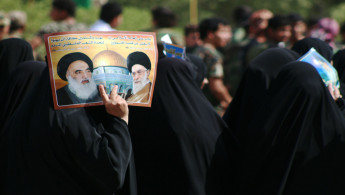Shia split: Sistani and Khamenei clash over Iraq's future
Iraq's Grand Ayatollah Ali Sistani and Iran's Supreme Leader Ali Khamenei are no longer singing from the same hymnsheet, according to informed political sources in Baghdad.
Sistani, the pre-eminent Shia religious leader in Iraq, has clashed with Khamenei over a number of Iraqi political issues, al-Araby has been told.
The disagreements have been fought over the management of the Popular Mobilisation Forces, reforms announced by Iraqi Prime Minister Haider al-Abadi - and Tehran's enthusiasm for Russian military action in Iraq against the Islamic State group (IS).
| Sistani believes that the recent Iranian dictates present a danger against the Shia community not only in Iraq but the entire region |
"Sistani believes that the recent Iranian dictates present a danger against the Shia community not only in Iraq but the entire region," a political source told al-Araby.
A prominent MP in the National Iraqi Alliance parliamentary bloc told al-Araby al-Jadeed that the disagreements between Sistani and Khamenei had intensified after the Iranian leader insisted on dealing with Iraqi affairs.
"The first contentious issue that led to a severance of ties between the two religious authorities is the issue of the Popular Mobilisation Forces. Sistani wanted these forces to be Iraqi rather than religious forces, however, they have turned into sectarian militias that have committed crimes, provoking Sistani's ire," said the high-profile MP.
"The second issue of disagreement is related to Abadi's reforms and his decision to relieve [former prime minister] Nouri al-Maliki of his position [as third vice-president], which Iran rejects, specifically Khamenei who insists on keeping Maliki in his position," added the MP.
Sistani also reportedly disagrees with Khamenei's desire to see Russian troops fighting in Iraq. The Iraqi, like Abadi, is understood to believe that relying on one strong ally, inthis case the United States, is better than involving parties that are antagonistic towards each other.
"Another point of disagreement is the issue of Iran sending Iraqi fighters to Syria to fight alongside [Syrian President Bashar] al-Assad, despite there being intense battles to be fought in Iraq. Iran is not sending Iranian volunteers to fight there, except the Revolutionary Guards who have been involved for years," said the Iraqi politician.
According to this Iraqi politician, the most recent spat between the two took place last Friday, when Sistani refused to receive an envoy from the Iranian city of Qom, the home of Iran's clerical establishment.
The envoy was reportedly carrying a letter from religious authorities in the city.
Sistani said there had been no prior coordination of the visit, which forced the emissary to instead visit the Shrine of Imam Ali in the city of Najaf and return home.
Detrimental policies
"Sistani has told people close to him that the policies of the Iranian Supreme Leader are increasing animosity towards the Shia, not only in Iraq but in other Arab countries as well," said the Iraqi MP.
| Khamenei believes that his wilayat al-faqih authority extends to Iraq, while Sistani rejects such intervention |
The prominent National Iraqi Alliance member believes that such disagreements might be reflected on the ground very soon, if Khamenei does not soften his position and adhere to Sistani's demands.
Meanwhile, Prime Minister Haider al-Abadi is reportedly attempting to create a Council for Strategic Policies with the help of Kurdish, Sunni and Shia parties, to be headed by former vice-president Ayad Allawi, according to leaked reports.
Abadi apparently intends to exclude hardline factions in the National Iraqi Alliance from the council, such as Maliki's supporters and the Fadhila Party.
Abadi's recent visit to Najaf - which coincided with a visit to the city by parliamentary speaker Salim al-Jabouri - was seen as an attempt to lay the groundwork for the formation of a new political bloc.
This would be composed of Abadi's wing in the Islamic Dawah Party, the Sadrists and the Islamic Supreme Council of Iraq, in addition to Sunni and Kurdish political groups, with the aim of forming an umbrella council to draw up the country's nation-wide policies.
"The conflict between Najaf and Tehran has become obvious as the two schools are fairly different - especially when it comes to the issue of wilayat al-faqih [the guardianship of the jurist]," said Abdul Wahhab al-Hussaini, a political analyst.
"Najafi scholars do not believe in this concept at all, but Khamenei uses it to shore up his authority and influence in the region, especially in Iraq," he added.
"Khamenei believes that his wilayat al-faqih authority extends to Iraq, while Sistani rejects such intervention, because the country has its own system of governance and the role of the religious authority [in Iraq] is strictly advisory."
As disagreements intensify, some Iraqi political forces will stand with Sistani, Husseini suggested, while others that are sponsored and heavily influenced by Iran will stand with the Khamenei camp, such as Maliki's bloc and allied Iranian-backed militias.
"Some observers believe that Sistani is concerned for the interests of Shias in Iraq, while Khamenei is only concerned with Iranian interests and agendas, even if they were to the detriment of others," said Hussaini.



